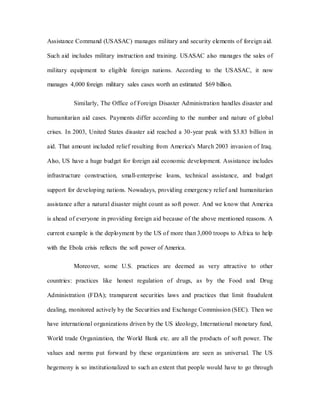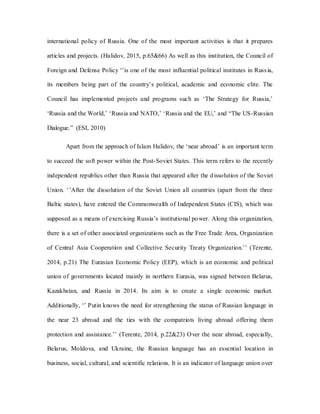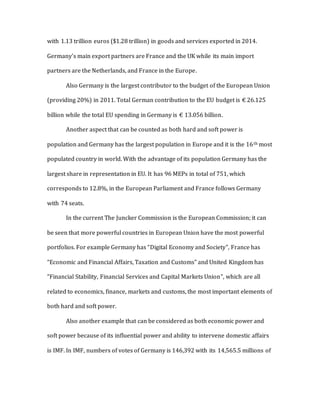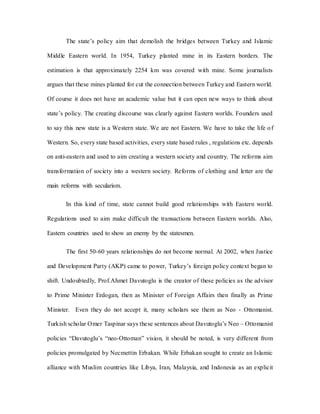1) The document discusses the concepts of hard power and soft power in international relations. Hard power refers to military and economic coercion, while soft power involves diplomacy and cultural influence to gain consent without imposition.
2) It provides examples of the limitations of hard power, like the US facing challenges in Vietnam and Iraq, despite overwhelming military strength. Overreliance on hard power can reduce a nation's influence and breed opposition.
3) Soft power involves cooperation and appealing to other nations through cultural and ideological attraction rather than threats. The US emerged as a global hegemon after WWII by employing soft power through initiatives like the Marshall Plan to counter Soviet influence and promote democracy and American values abroad.



![the most powerful soft power in the world, but also their challengers: China which is
developing its Soft Power, and Russia, and its influence on Post-Soviet states. We will
also interest to some regional hegemons and their influence on the region: with Germany
in the European Union, and Turkey in the Middle East.
The term Hard power has a long history, As mentioned previously it consist of
military capabilities, as described by Machiavelli in the princes: "I judge those princes
self-sufficient who, either through abundance of troops or money, are able to gather
together a suitable army and fight a good battle against whoever should attack them; and
I consider those who always need the protection of others to be those who cannot meet
the enemy in the field[.]"[1]
Due to self-fish nature of human being, Hobbes in the Leviathan goes on to
state that the powerful hegemon is very important to constraint selfish desires of human
beings, he expands the measures of power by adding the ability to have a control not only
on armed forces, but also economic and financial forces.
The power to which these thinkers are suggesting is “the hard power”. The
term is precisely explained by the contemporary thinkers in the international relations.
Joseph Nye for example, describe hard power as the ability to use coercion (sticks) and
payments (carrots) to make others follow your will and for this reason, The United States
possess the most of the hard power in terms of military budget spending of almost $600
billion, military troops have lots of experience of using it in battle, due to this Chinese
commanders thinks that they cannot match American hard power until 2050, America has
a lot of allies everywhere Unlike China and Russia, who have few real friends. That gives
America an advantage of spreading its forces widely. These measures gives America](https://image.slidesharecdn.com/38131902-30e4-4e5a-8d26-75296bb8fa71-160404221118/85/soft-and-hard-power-4-320.jpg)









![of this annexation, the unipolar system, which was dominated by the USA, has started to
end. (Askeroğlu, 2014)
1)Russia-Armenia Relationship
As it is known, a Russian Su-24 warplane was shot down after it veered into
Turkish airspace and the first time a country, which is a member of NATO shot down
Russian plane in 60 years.
After this development, Russia unified air defense system in Caucasus with
Armenia, which was a member of the USSR before Soviet Union collapsed. Alexander
Luzan who was the former deputy undersecretary of Russian land forces said to “Today,
aviation plays the most important role in military. Turkey is a member of NATO and
there are not only Turkish aircrafts inside Turkish territories; the United States also uses
air bases [in Turkey]. There is a need for a more serious system that will strengthen [our]
air space and for this aim, the unifying of forces is needed’’ (Doğan News Agency, 2015)
on December 23.
It is interpreted that Russia tries to form a strong bloc on Neo-Soviet land against
the powerful blocs of the West and the USA.
RUSSIA’S SOFT POWER OVER THE POST-SOVIET STATES:
The term soft power was defined by Joseph Nye as ‘’the ability of a county to
persuade others to do what it wants without force or coercion’’ (Nye, 2004) at the end of
1980s. A country that wishes to dominate others has to use both hard power and soft](https://image.slidesharecdn.com/38131902-30e4-4e5a-8d26-75296bb8fa71-160404221118/85/soft-and-hard-power-14-320.jpg)


















